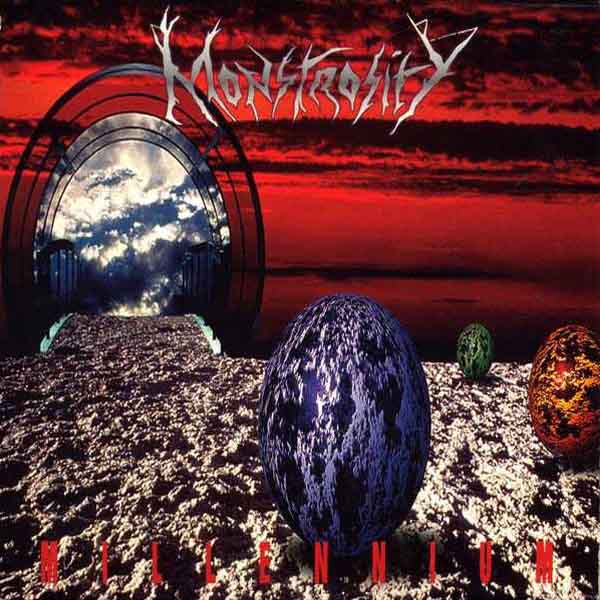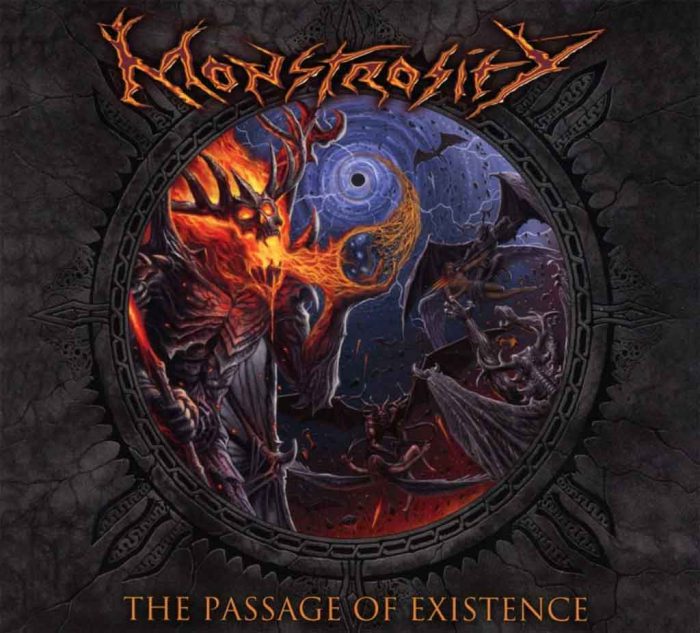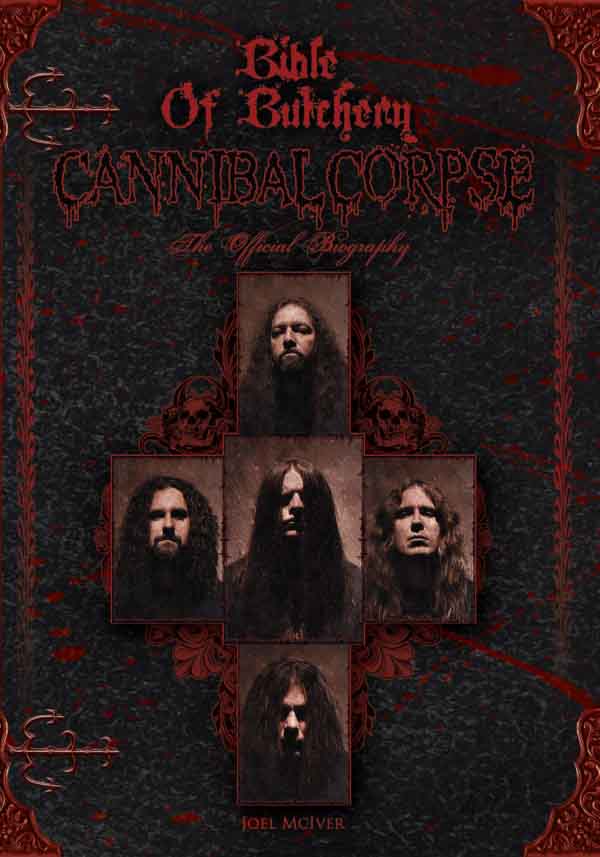monstrosity (original) (raw)

Guest article by Svennerick
Released in August of 1996, Monstrosity’s second effort Millennium is an album I personally hold in very high regards, considering I nearly spent eight months listening to it multiple times a day. This is an addictive album and each new listen made it clearer why this album stands head and shoulders above anything released under the term “technical death metal.”
Tags: analysis, death metal, millenium, monstrosity, Technical Death Metal

When training various elements can influence one’s psyche and it is essential to “program” one’s mind to be as productive as possible in the little that most Hessians can dedicate for training. Music can strengthen certain emotions and conjure up feelings of strength, fortitude and determination which are mandatory qualities to progress in any domain. At times the flow of an album doesn’t correlate with a training session and it can be interesting to create playlists of different artists. Here is a playlist that I personally use when working muscular endurance/cardio for upcoming competitions.
Tags: blind guardian, Commandments, Demolition Hammer, Desecrator, Exhorder, hessian, iced earth, Kamikaze, Majesty, monstrosity, Nihilist, pestilence, Stormrider, suffocation, training, villain
The task before a reviewer varies widely. If you want to be a big shot, you need to write about what the labels want, since they are the only source of top-down money coming into the genre. They will then reward your publication with advertising, it will then reward you with a promotion, and eighteen months later, you can ditch it and move up to the big leagues.
Tags: 2018, Angantyr, archgoat, best of, black funeral, Black Metal, condemner, death metal, deceased, Drawn and Quartered, Grindcore, Heavy Metal, internal bleeding, iskandr, judas priest, kever, master, monstrosity, nachtlieder, phosphore blanc, progressive metal, retortion terror, Satan, slam metal, sludge, Speed Metal, Summoning, Therion, trenchant, underground metal
Monstrosity – The Passage Of Existence Metal Blade Records, 2015
Working within an establishment genre presents a challenge to the musician: the major patterns are known, and the audience has been inundated with an abundance of bands who can play the style of the classics note-perfectly, meaning that musicians have to either add new aesthetics to attract a lot of fans, or play a subtle take on the older for those with some knowledge.
Tags: death metal, Heavy Metal, metalcore, monstrosity
Derided mostly by casual noticers of their cover art, Cannibal Corpse created a public face for death metal by becoming the most popular death metal band in history. Outselling the rest of the genre, they have kept on tour and pushing out albums for two and a half decades and now have unleashed their thirteenth album. Veteran music journalist and metal writer Joel McIver caught up with the band and wrote a history and explanation of Cannibal Corpse.
Intelligently, McIver opted not to try to make a narrative of his own. Instead he took a Glorious Times approach and let the band speak for itself for the most part, then knitting the disparate statements together into single narratives. The first two thirds of the book consists of statements from the band members which come across as unedited although their length suggests they were assembled from multiple interviews. The last third of the book contains a history of the band as a whole told through excerpts from interviews with the band, managers and other members of the underground community. The entire book is interspersed with song lyrics with brief explanations from the band. As a result, this book becomes easily readable and very personal, avoiding the pitfalls of trying to become overly formal or over-analytical with a band that does not want to be taken overly seriously.
In our twenties, we weren’t thinking too seriously about this stuff. Chris wrote the lyrics and we gave him free rein to be as offensive and disturbing as he thought necessary. Nowadays we probably think a little more about the subject matter of our songs, and the end result can be lyrics that are still horrifying but less overtly offensive. I think that sometimes a more subtle approach can be more effective for horror fiction anyway—‘subtle’ being a very relative term in our case, maybe the difference between a hatchet to the genitals and a hatchet to the head. But that’s what our band is doing really: putting horror fiction to music. We don’t back what the characters in our songs are doing: they’re just evil characters who are appropriate for stories like these. – Alex Webster (121-122)
If the book has a theme, it can be found in the normalcy of Cannibal Corpse. The band member biographies detail their early interest in heavy metal, then in musicianship, and their desire to be part of the new movement of harder and heavier music coming out after Metallica and later, after the first nascent death metal. They mention the classics of proto-underground metal like Sodom and Slayer, but focus on not the extremity of lyrics but the music itself. These men wanted to make music that did what their musical heroes did, but took it to a new level of intensity. They also wanted to have a sense of humor about it. And, going back to their earliest influences, they found idols who had also made it big on a commercial level: the 1970s hard rock and heavy metal acts that shocked the uptight citizenry but delighted mischievous and alienated kids everywhere. The comedic lyrics of torture, sadism, butchery, gore and mass killing arise not from a fascination with the dark and morbid, but a joy in disturbing social pretense that has more in common with Kiss or Judas Priest on the big stage, gyrating away as church ladies gasped.
When assembling the narrative of the band, McIver stacked statements from band members in such a way to tell the narrative through its strongest voices, inserting summaries of major events so that the least specific material is told from a third-person perspective. This gives more space to the band to speak about their own intentions and analysis, which enables this book to move along at a fast pace and never wind down into the kind of rambling anecdotes that blighted rock journalism in the 1970s and 1980s. As a result, it is both a short book and complete in its recounting of the Cannibal Corpse story. Through skillful editing, McIver avoids having the history drag or become tangential, and with the voices of the band members he brings up every essential topic in short, readable fashion. We also hear from band members and crucial actors like label boss Brian Slagel whose voices are not normally heard in the telling of this history.
In my downtime, I shoot guns. I’ve been interested in them since I was a kid. It’s the other thing I’m interested in apart from guitars, and it’s a great way to let off aggression. I go to ranges and shoot targets. Playing loud music is another good way to release stress. I like to go to the gym and work out, and I like to go out and drink and have fun with my buddies. Luckily, I’ve always been able to go anywhere and make friends. I live day by day. I would never have guessed that I’d still be doing this after all this time… — Pat O’Brien (46)
In the history of metal, Cannibal Corpse: Bible of Butchery will be remembered as a book that started a debate instead of ended one. Most analysis of Cannibal Corpse so far has focused on the reactions of others and has been unable to get around the disturbing imagery and lyrics. By mixing lyrics with histories, and looking at the motivation of band members for personal and artistic goals instead of reading the band as an advocate of what is described in its lyrics, Cannibal Corpse: Bible of Butchery reveals the commonality of Cannibal Corpse with heavy metal bands since the dawning of the genre. Instead of serving as a kind of unpaid advocate for serial killers everywhere, this band acted as a continuation of the heavy metal tradition of upsetting parents and delighting kids. By getting past the elephant in the outsider viewpoint room, McIver shows us Cannibal Corpse as they are, and lets their story tell itself and reveal the undiscovered history behind what for most people is the public face of death metal.
- Cannibal Corpse: Bible of Butchery via MetalBlade Records
Tags: alex webster, brian slagel, cannibal corpse, george fisher, joel mciver, monstrosity, pat o'brien, paul mazurkiewicz, rob barrett


